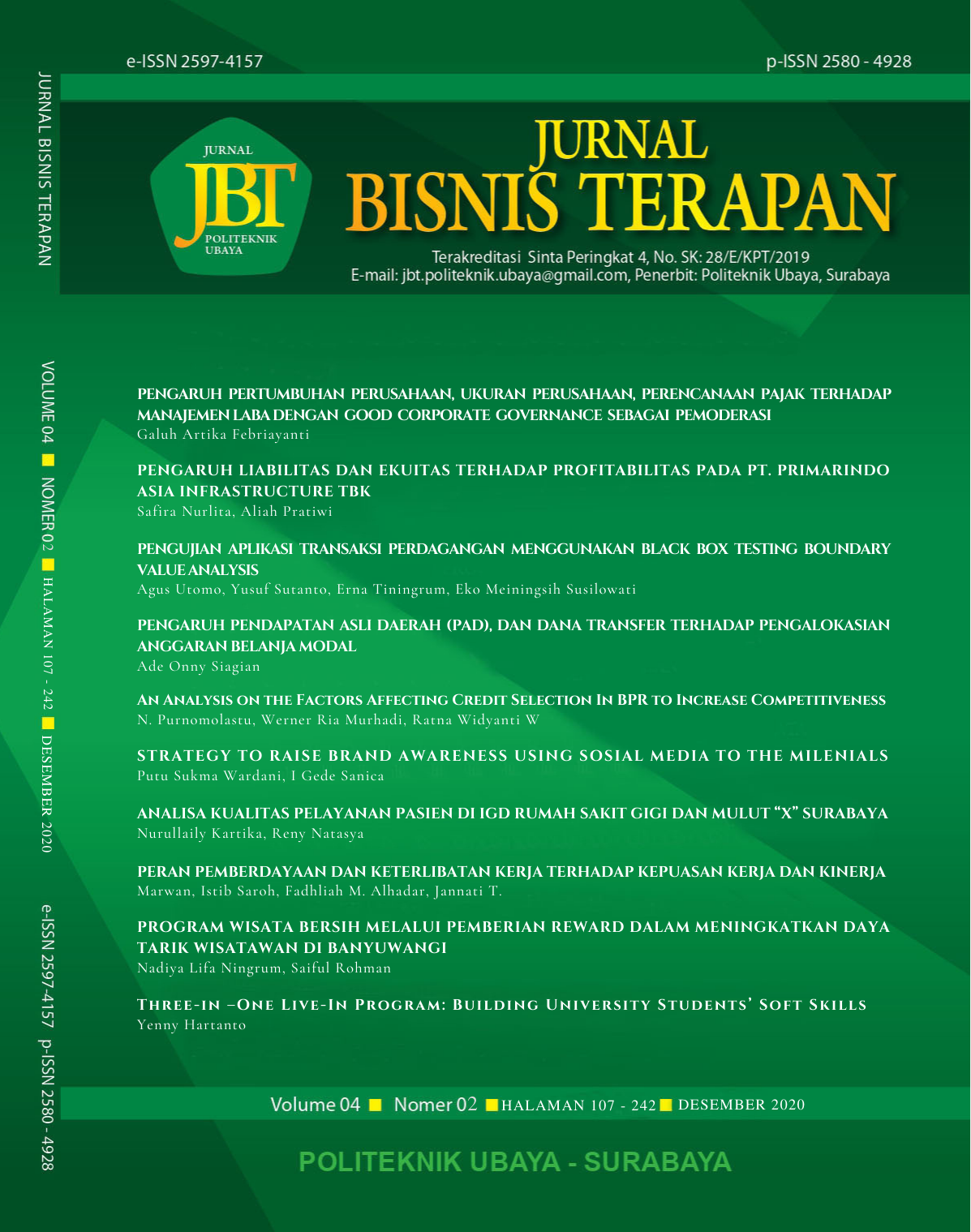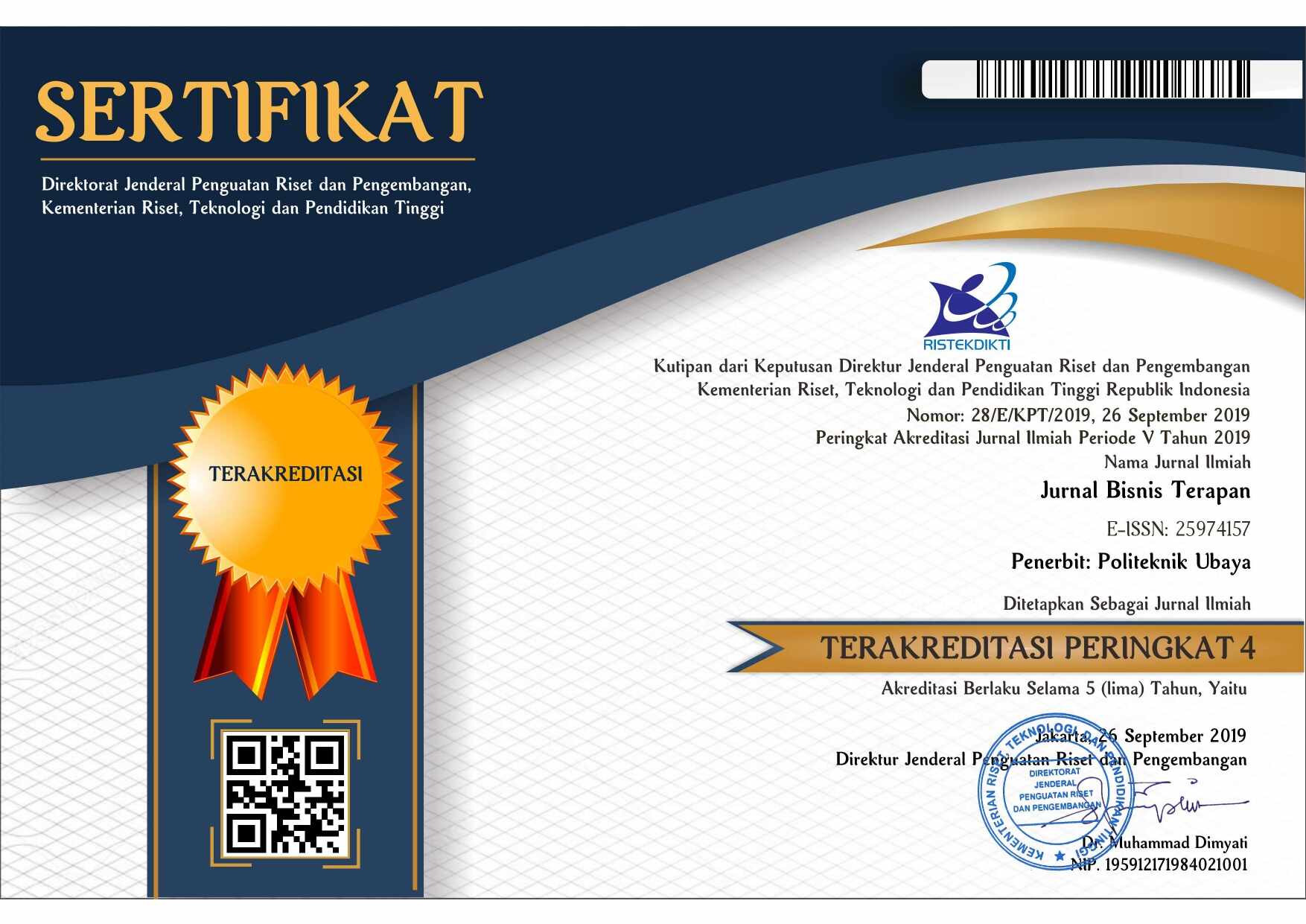PROGRAM WISATA BERSIH MELALUI PEMBERIAN REWARD DALAM MENINGKATKAN DAYA TARIK WISATAWAN DI BANYUWANGI
 Abstract Views:
688 times
Abstract Views:
688 times
 PDF Downloads:
919 times
PDF Downloads:
919 times
Abstract
Tourism is the leading sector in Banyuwangi, but the increasing number of tourists who is visiting Banyuwangi will causes more and more volumes of waste. Bangsring Underwater is a top destination Banyuwangi that is Frequently visited by tourists. The purpose of this study is to find outthe solutionswhich related to waste problems in order to Minimized the impact and supporting factors and obstacles in the implementation of waste management programs in Bangsring Underwater tourism.The method in this study was qualitative method. The result of this study is lean tourism programs that Is realized by the movement for not leaving garbage on tourism place. This program is carried out by providing garbage bags from totebags as trash that cangenerated from every tourist activity during their visit. Garbage in the totebag is obtained from the packaging of food and beverage waste carried by tourists when traveling and garbage around them. When tourists left,. The totebag which is containing garbage must be returned to manager at the exit door. If they do that kind of thing, they will be rewarded This is an advantage in the program carried out by researchers. Reward in the clean travel program is an award for who has been following the rules which determined by tourism manager. The supporting factors in this program are come form management of bangsring underwater banyuwangi also departement of culture and tourism and the banyuwangi environment agency. While the inhibition is on formation of a hygiene monitoring team in Bangsring Underwater.
Downloads
References
Bungin, Burhan. 2010. Metode Penelitian Kualitatif. Jakarta: Kencana.
Creswell, John W. 2015. Penelitian Kualitatif & Desain Riset. Yogyakarta: Pustaka Pelajar.
Hasan, M. Iqbal. 2006. Pokok-pokok Materi Metodologi Penelitian dan Aplikasinya. Jakarta: Ghalia Indonesia.
Indriantoro, Nur dan Bambang Supomo. 2002. Metodologi Penelitian Bisnis. Yogyakarta: BPFE-Yogyakarta.
Karmana, Oman. 2007.Cerdas Belajar Biologi, Grafindo Media Pratama, Bandung
Keputusan Menteri Perindustrian dan Perdagangan RI No. 231/MPP/KEP/7/1997 Pasal 1 tentang Limbah
Larasati, Mega. 2017. https://foresteract.com/limbah-pengertian-jenis-dampak-dan-pengelolaan/. Diakses Tanggal 18 April 2019 : Pkl.14.00
Nazir. 2005. Metode Penelitian. Cetakan ke-6. Bogor Selatan: Ghalia Indonesia
Sugiyono, 2008. Metode Penelitian Kuantitatif, Kualitatif, R&D. Bandung: Alfabeta
Spillane, James. 1982. Ekonomi Pariwisata. Yogyakarta: Kansius
Sutrisno, Edi. 2009. Manajemen Sumber Daya Manusia. Edisi pertama. Kencana Prenada Media Group. Jakarta.
Undang-undang Republik Indonesia No. 10 Tahun 2009 tentang Pariwisata.
www. mediaindonesia.com (diakses pada tanggal 30 November 2020, pkul: 14.14WIB)
www.suara.com/bisnis/2019/04/03/141249/kesedihan-susi-melihat-sampah-di-bangsring-banyuwangi-saat-beri-makan-ikan.( diakses pada tanggal 01 Desember 2020, pukul 10.03WIB)


This work is licensed under a Creative Commons Attribution-NonCommercial-ShareAlike 4.0 International License.

Ciptaan disebarluaskan di bawah Lisensi Creative Commons Atribusi-NonKomersial-BerbagiSerupa 4.0 Internasional.
-
Articles published in Jurnal Bisnis Terapan are licensed under a Creative Commons Attribution-NonCommercial-ShareAlike 4.0 International (CC BY-NC-SA 4.0) license, which permits anyone to copy, transform, or redistribute articles for any lawful purpose in any medium, provided appropriate credit is given to the original author(s) and Jurnal Bisnis Terapan is recognized as its original publisher. A link to this license should also be provided. Any derivative work of an article published in Jurnal Bisnis Terapan must also be shared under the same (or compatible) license.
-
Both copyright and publishing rights on articles are retained by the respective author(s), without restrictions. Only a non-exclusive license is granted to Jurnal Bisnis Terapan to publish the article and identify itself as its original publisher.

 DOI:
DOI:






